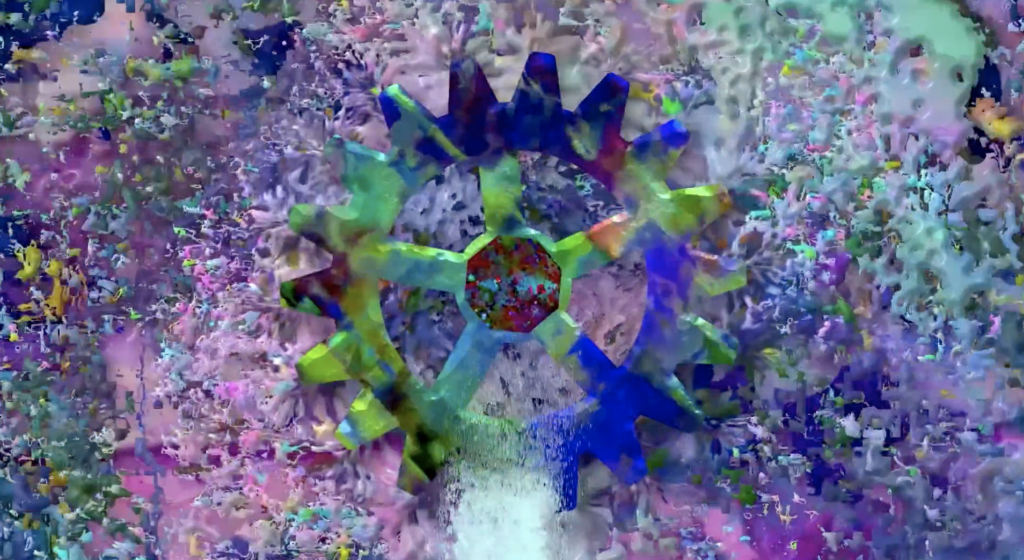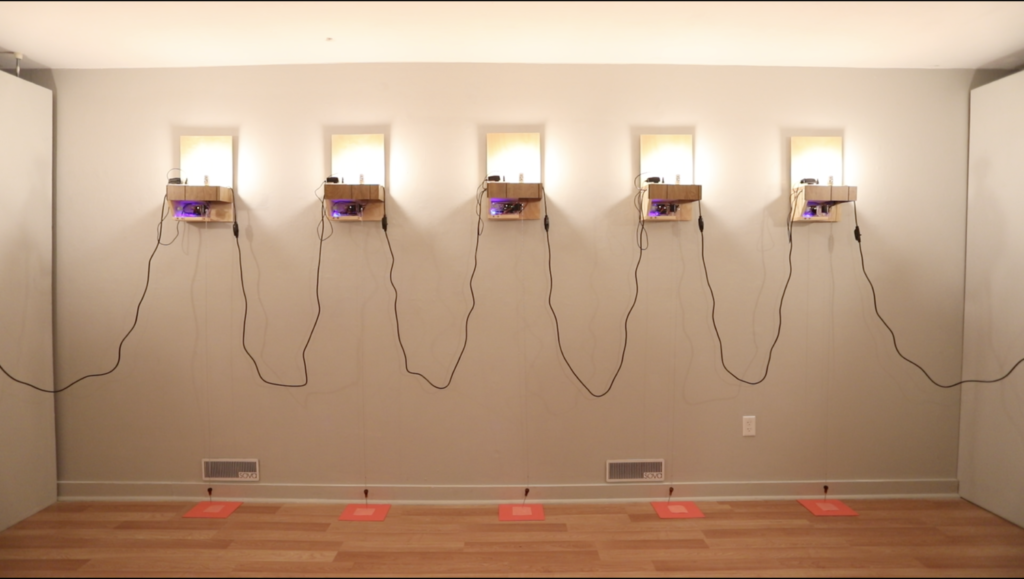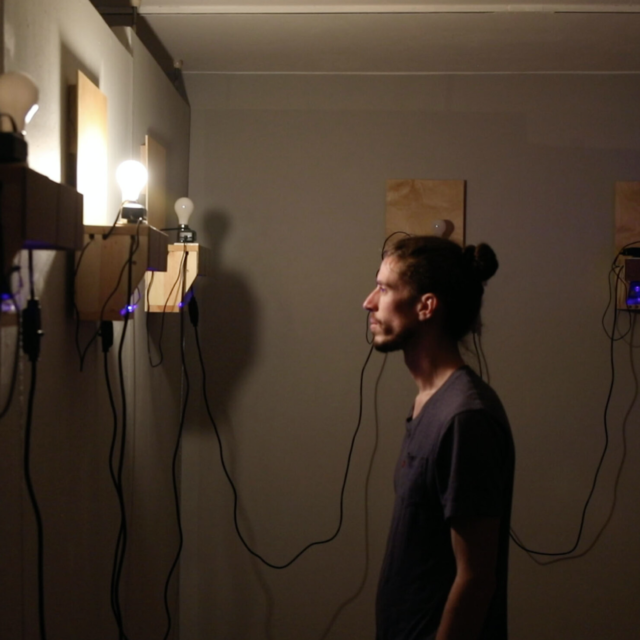This week in Alumni Highlight series, Gallery intern and studio art major Adrienne Lee ’21 interviews Carter Eggleston ’11. Eggleston is from Afton, Virginia. In 2011, he received B.A. at Davidson College as a studio art major and math minor, and received M.F.A. at Virginia Tech with a focus in creative technologies in 2017. He is currently an Adjunct Lecturer in Art at Davison College.
Carter Eggleston ’11: After Davidson and a few years of figuring out what I was trying to do, I ended up going to Virginia Tech. I’ve been trying to remain in art in academia as a professor. I’m interested in the way that art allows you to think about things and it works your brain differently than other, more empirical disciplines. Right now, I’m trying to figure out the pandemic like everyone else: finding the balance between that and making my own work. I was lucky to be back here as a sabbatical replacement [for Professor Joelle Dietrick]. It’s good to be back!
Adrienne Lee ’21: I want to go back to a point you made; it’s interesting how you made a distinction between art and something empirical. When you say “empirical,” are you referring to your experience with math?
CE: Probably so. I appreciated having math classes in Davidson alongside art. In math, I could feel confident about arriving at an answer. In art, that confidence is harder to find … especially the nature of going back to things and reworking it. That’s frustrating at times, but also refreshing.
AL: Were there certain skills you acquired from Davidson that influenced your future decisions? I guess I am asking for students who look up to Davidson alumni and try to figure out what they’ve done, what they’ve learned, or what they find most interesting in moving forward.
CE: There wasn’t one class in particular which I felt was the signpost for the rest of my life. Courses in Davidson push you to be critical and to reflect on what you are dealing with in class, but also how that interacts with your own life, life experience, as well as your ambitions, hopes, and dreams. And that interrelatedness of things has stuck with me. Continuing art is not necessarily the easiest thing. But I think for me, being in VAC or in the studio alongside people for long periods of time were moments that were really valuable to me.
That was one of my biggest worries about this semester with the pandemic. We lose the spontaneous, unintentional, unplanned moments that comes out of those moments in studio. The insights, developments, and explorations. For me, that is the most formative part of being an art major in Davidson. I think that – more than anything else that I did here in Davidson – working next to people is the reason why I’m still doing what I’m doing right now. That’s the reason why I went to graduate school and why I’m still in the academic setting.
I took some time to recalibrate and remotivate after Davidson to go to Virginia Tech. It was interesting to leave Davidson and moving into whatever comes next. For some people, it makes sense to go straight to graduate school. For me, it was important to me to take a break.

AL: As a senior and studio art major, I have spoken to few Davidson alumni as well. They recommended me to “live life” after college or to incubate my ideas and aspirations. Is there something specific you liked about taking a “break” after Davidson? Did you continue to pursue digital art?
CE: I actually did not do any digital art in Davidson. I mostly did printmaking and sculpture. After Davidson, I tried to continue printmaking the best I could, but it’s hard to do them without the facilities and equipment. But I did work for different letter press shops as an intern. I did a lot of printmaking in my bathroom or living room doing wood cuts, printing, etc. I got into digital art when I took night classes for computer graphic design at a community college. Later, I found creative technologies at Virginia Tech. I wouldn’t say that I’m a die-hard digital artist. I still love drawing and the traditional forms, but digital art does open up different options. Artists are always inclined to use newer discoveries in the name of art, and there is certainly a lot of things available, digitally- or technologically speaking that comes into our world today. Being knowledgeable in that area opens up different job opportunities as well.
At Virginia Tech, I did mostly video animation or sculpture, specifically, kinetic sculpture: using sensors or motors and having interactivity be present in the work. Since Virginia Tech, I haven’t done much with sculpture just because of the pandemic. I haven’t been really feeling it. It’s easier to be a digital artist right now – it’s convenient.

AL: Do you have a comment for studio art majors or minors who are thinking about studio art, in the context of pandemic? About staying focused – about remaining focused or inspired? As someone who is about to graduate, I am becoming quite nostalgic about my experience as a freshman in Davidson, and I know that I have personally maintained some form of studio practice while continuing to be inspired by things. I was wondering if you had a few words on that as an artist – and also as an instructor right now.
CE: I think art can offer a way of processing the world around you that doesn’t need to rely on logic, direct evidence, or causality. They can be really useful right now, when there’s a lot of hard things to process. And while there is a lot of things are changing rapidly with a high degree of uncertainty. Artistic exploration – even if it doesn’t give us the answer we sought when we started – can give answers that are equally valid and useful. But these days, everyone says things like, “I’m going to be quarantined right now, I’ll do all these art projects!” There’s a time for that, but there’s also a time for a break. I think being aware and being receptive of things that are happening is important. It will definitely provide some sort of creative inspiration later. I tend to be the type of person who thinks about something for a while and respond later well after that fact: be tuned in, absorb things. It will allow for things to grow from then on. I don’t know what advice there is for art majors / minors. I wonder what I would have wanted for someone to tell me.
AL: Some of my friends who have graduated confessed that for them, GPA mattered less towards the end of their year. They were more concerned about the transition after Davidson. Focusing on internships, jobs … next chapter in life.
CE: I think making art should be part of you. If you get as far as a studio major or minor, you get fulfillment from making art. Continuing to find ways to do that outside of assignments for class is really important. I think that, to a certain point, people who are art majors or minors feel that they have individual motivation and drive. They have ideas that are of their own and are leaning into what will carry you out farther as an artist. As a teacher, I don’t want to tell people what to do. My role is to try to help a student make what they want to make which comes from what’s within that person. Finding ways to do that in repeatable ways is my advice.
-Adrienne Lee ’21

